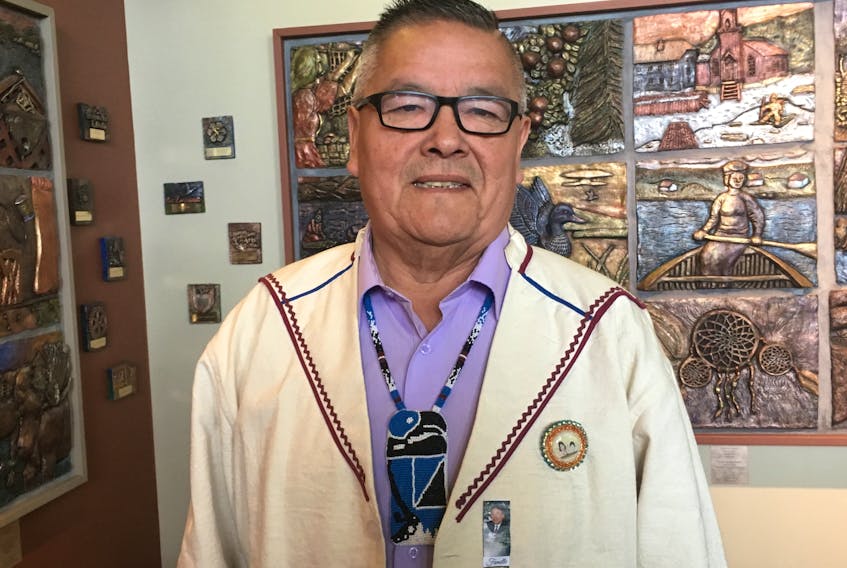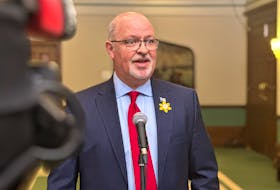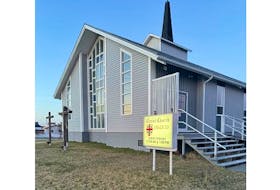The Commission of Inquiry Respecting the Muskrat Falls Project was told an Innu translator was not available for the testimony of Conseil des Innus d’Ekuanitshit Chief Jean-Charles Piétacho Thursday morning.
In the introduction to his testimony, there was a suggestion Piétacho would be comfortable speaking in his second language of French, but the chief made it clear that was an incorrect assumption.
Related story:
Inquiry witnesses speak to traditional use of river and Muskrat Falls
After being sworn in, translator Claire Wilkshire said she could not offer an English translation of Piétacho’s response to a question from inquiry co-counsel Barry Learmonth, because the response given was not in French.
It was in his Indigenous language.
“My language, my life, my culture are not being respected,” he said, speaking subsequently in French, with the statement offered in English through the translator.
“I would like to speak my language. My second language, French, is not my language,” he said.
Commissioner Richard LeBlanc halted proceedings at that time, posing a question to the chief.
“Would he prefer that I actually set his testimony over to another time, when I can actually get an Innu translator?” he asked.
“Sincerely, what I would like is to feel respected,” Piétacho responded through his translator.
“We will arrange for you to testify at another time during the Inquiry, to present your evidence on the issues that we’re talking about today,” LeBlanc said, adding there would be a time found to accommodate all parties.
With indication further discussion was needed, a break was called in the inquiry proceedings.
Piétacho left the building.
“There was an error made in preparing for today,” LeBlanc said, on return from the break. He added he appreciated Piétacho’s position and would have his testimony at another time.
Piétacho did testify earlier in the Inquiry proceedings, in Happy Valley-Goose Bay. He was speaking then to traditional land use in the project area, but also his testimony was offered in his first language.
Language has been an issue not only for Piétacho, but for the entire Conseil des Innus d’Ekuanitshit since the start of the Muskrat Falls project. All 600 members of the Conseil des Innus d’Ekuanitshit have Innu as their first language and French as their second language, but notices from the provincial government are commonly issued in English.
The adequacy of general consideration, timelines and financial support for consultations throughout the project has also been at issue.
In questions Wednesday to current provincial deputy minister for Indigenous Affairs Aubrey Gover, council lawyer David Schulze challenged Gover in his assertions all Indigenous groups were given equal consideration and a fair level of consultation during the development of the hydro project. Schulze said it was news to him.
“All 10 Indigenous organizations, regardless of their strength of claim, got essentially the same consultation process. In terms of steps and in terms of opportunity for input and in terms of the response the government would give in relation to the input,” Gover said Wednesday.
“Those that deserved the highest level of consultation received it. Those that would be deserving of a lower level of consultation, received more than they would have deserved in law, but so be it. We are interested as a government in Newfoundland and Labrador – as I said earlier – of soliciting all the concerns from every Indigenous organization we engage, fully and fairly considering those concerns and trying to work with ourselves, with the federal government, with the proponent, to take reasonable steps to address those concerns.”
NunatuKavut Community Council president Todd Russell was similarly critical of Gover’s statements Thursday morning, having taken the stand just prior to Piétacho. While on the stand, Russell was directed by Nalcor Energy lawyer Dan Simmons to a ruling quashing a challenge to the development’s progress by NunatuKavut, explicitly stating NunatuKavut had been fairly consulted.









